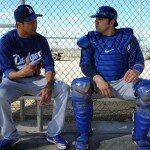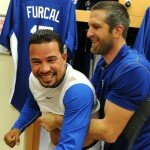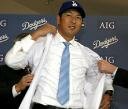On the eve of Spring Training for the Dodgers. I thought it would be fun to check in on some of the 2011 Dodger players that departed Chavez Ravine for (hopefully) greener pastures in 2012. As you will see, some of our old friends are embarking on new chapters, some are being reunited with old friends, while others are struggling to secure roster spots and keep their major league careers going:
Tom Singer from MLB.com takes a look at the new Pirates’ battery of A.J. Burnett and Rod Barajas, and why Barajas is thrilled to be reunited with his 2008 Toronto teammate.
Patrick Saunders and Troy Renck from the Denver Post touch on Casey Blake’s challenge in holding down third base for the Rockies.
The Associated Press looks at Jonathan Broxton’s new beginning in Kansas City as the set-up man to closer Joakim Soria, and why the Royals were the former closer’s first choice.
Jamey Carroll talks with Tyler Mason from FS North about being the Twins new starting shortstop at 38 years old.
Matthew Leach from MLB.com examines Rafael Furcal’s battle to show his power and ability to consistantly get on base for the Cardinals at 35 years old.
Paul Hoynes from The Plain Dealer states that Jon Garland’s physical with the Cleveland Indians didn’t happen today as planned, which is significant as the pitcher’s minor league contract is contingent on him passing the examination.
Larry Larue at the News Tribune examines the complexities of new Mariner reliever Hong-Chih Kuo.
Bryan Hoch talks with Russell Martin and Hiroki Kuroda about Kuroda’s transition to the Yankees, and how it compares to Kuroda’s arrival in Los Angeles from Japan.
Alex Speier from WEEI Sports Radio reports on Vicente Padilla’s legal challenges as he attempts to get to Spring Training on time to compete for a roster spo with the Red Sox.
Photo Credit: Jon SooHoo/ Los Angeles Dodgers 2011





